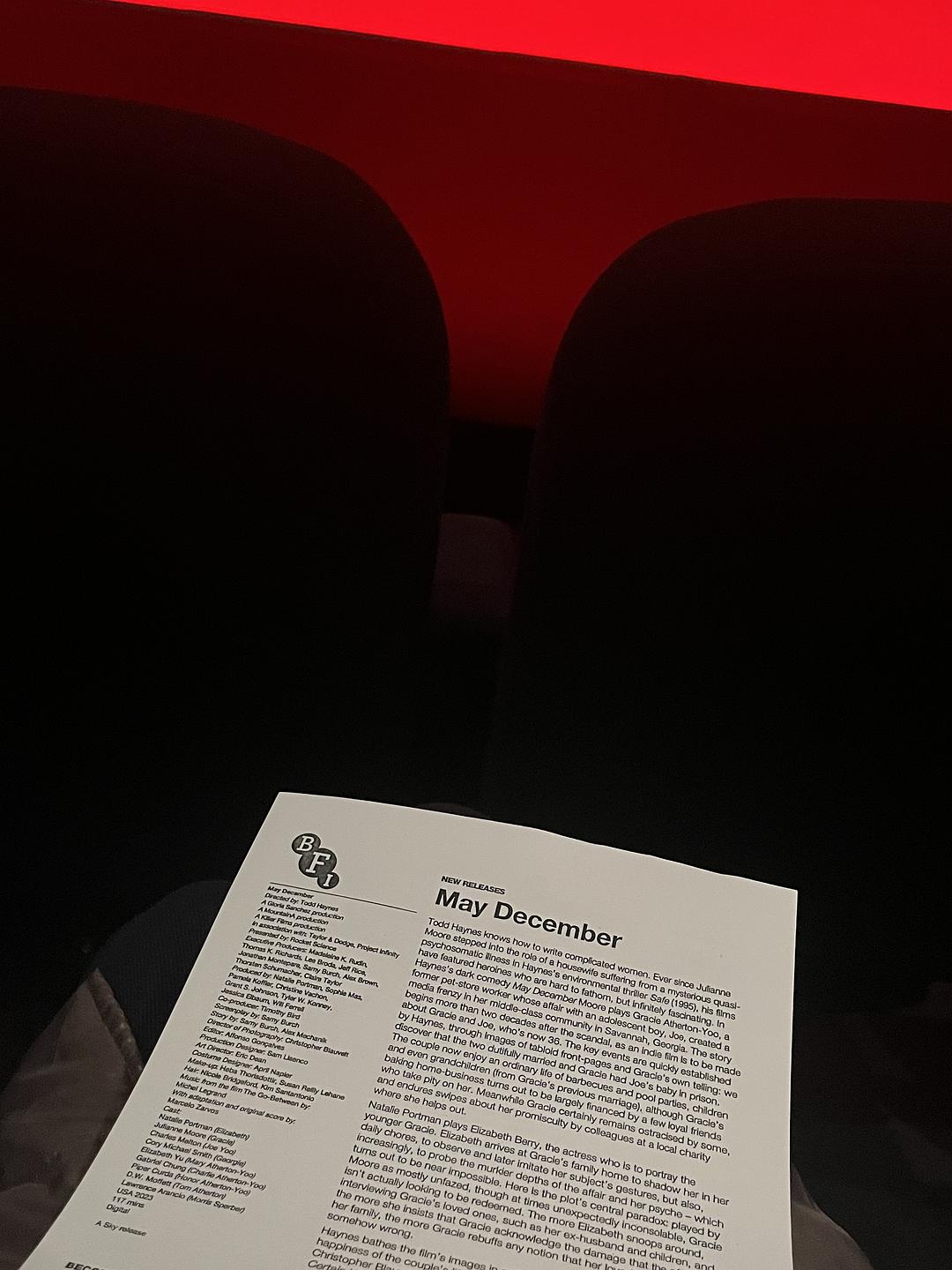Daydream ☁️ • 五月十二月:当道德半透明化 | 伦敦BFI纸质资料翻译,附《视与听》原文
最近伦敦地铁好多May December的宣传海报,今晚Lecture 结束转身去了隔壁BFI南岸影院刷片,进影厅时顺手捎了入口处的纸质材料(典型的 BFI 电影研究作风,没有纸质票但有印满A4纸正反两面的纸质电影资料和影评,贴心),回来深夜复盘该电影,于是有了以下文章。
原文放在最后。
剧透预警。
托德·海因斯(Todd Haynes)深知如何刻画复杂的女性角色。自朱丽安·摩尔(Julianne Moore)在海因斯的环境惊悚片《安然无恙》(Safe,1995 年)中饰演一位身患神秘准精神疾病的家庭主妇以来,他的电影中就出现了许多难以捉摸却又令人无限着迷的女主角。在海因斯的黑色喜剧片《五月十二月》中,摩尔饰演的格蕾丝·阿瑟顿·尤 曾是一名宠物店的已婚员工,她与正处青春期的男孩乔热恋的这一事件曾在佐治亚州萨凡纳的中产阶级群体引起不小的热议。本影片的故事开始于该丑闻发生的二十多年后,故事起因是一部关于格蕾丝和现年 36 岁的乔的独立电影即将开拍。通过导演海因斯给出的当年小报头版以及影片中女主人公格蕾丝的自述,该影片的关键事件迅速呈现在观众眼前:两人非常尽责地结了婚,格蕾丝在狱中生下了乔的孩子。
如影片所示,尽管格蕾丝的手工烘焙事业主要由几个同情她的忠实朋友资助,这对夫妇现在正享受着普通人的生活:烧烤、泳池派对、孩子甚至孙子(来自格蕾丝的前一段婚姻)。与此同时,格蕾丝难免仍受到部分人的排斥,她还在当地一家慈善机构工作,日常忍受着同事们对她过往的抨击。
娜塔莉·波特曼(Natalie Portman)饰演的伊丽莎白·贝瑞(Elizabeth Berry)即将在改编自该事件的独立电影中扮演年轻时的格蕾丝。也因此,伊丽莎白来到格蕾丝的家,跟踪她的日常琐事,观察、模仿她的一举一动,同时深入感受她婚外情和她心理的阴暗面——然而这几乎是不可能的。这也是剧情的核心悖论所在:摩尔饰演的格蕾丝虽然有时出人意料地悲痛欲绝,但大多数时候并不动摇,她其实并不希望得到救赎。伊丽莎白越是四处打探格蕾丝所爱的人(比如她的前夫和孩子)越是坚持要她承认出轨对她的家庭带来的伤害,她就越是抵触任何认为她对乔的爱是错误的观点。

海因斯让影片的画面沐浴在柔和的南方光线中,特别强调了这对夫妇的幸福生活。在资深摄影师克里斯托弗·布劳维特【 Christopher Blauvelt,凯莉·赖查特(Kelly Reichardt)的《米克的断头路》(Meek's Cutoff,2010年)、《某些女人》(Certain Women,2016年)和《第一头牛》(First Cow,2019年)的摄影师 】的手中,强烈的光线几乎直接蒸发了所有坚硬、粗糙物体的细微质感,使其半透明化。在这样的世界里,似乎没有什么可以隐藏。然而,在伊丽莎白的蚕食下,格蕾丝的人格慢慢出现裂痕。格蕾丝对女儿们体重的评论体现了她对来自母亲的沙文主义态度的深深内化。事实上,她作为母亲,对乔的纵容(虽然也可能是较为细微的控制)与对孩子们的严厉态度形成了鲜明对比。
查尔斯·梅尔顿(Charles Melton)饰演的乔一脸稚气、纤弱柔弱,为故事注入了可喜的直率,与格蕾丝和伊丽莎白无限的猫鼠之舞截然相反。尽管女演员伊丽莎白口口声声说自己的初衷是好的,但却冷酷无情,一心想在新角色上有所突破,不惜对格雷西和她家里的每个人下手。而女主人格蕾丝则执著于把小23岁的乔看成与她完全平等的人(无论年龄大小),以至于她始终无法摆脱该事件中的烟雾与镜像。与她们不同的是,乔似乎才是真正早追求更深层次的个人真理,即使最终也无法从他支离破碎、充满矛盾的生活中取得结果。海因斯的影片在这种真正的痛苦和模糊的时刻最为闪亮,这种痛苦和模糊与格蕾丝顽固地坚持自己的形象形成了鲜明的对比。
在这部影片中,虚构与事实、自我欺骗与自我真相都被赋予了危险的色彩,归根结底,影片的重点并不在于格蕾丝的行为本身,而在于社会层面希望她因行为表现出的自责,即使她根本没有感到自责。当社会需要殉道者时,格蕾丝却拒绝成为殉道者,这既令人刚到晕眩,又令人恼火。
在影片选角上海因斯选择了一位白皙的金发女演员,而另一位则是一位褐发女演员,这不禁让人将其与伯格曼的《人格》(Persona,1966 年)相提并论。不过,虽然这两个女人之间肯定存在着寄生性的权力游戏,但影片的前卫和讽刺基调使其更接近于古斯·范·桑特(Gus Van Sant)的《To Die For》(1995 年)。影片强有力地展示了一个女人是如何既被有毒的社会规训所惩罚的和全盘的婚姻童话所迷惑,又对自己的掠夺行为深表否认的。在《五月十二月》中,真正的道德底线不断被跨越,这部影片强有力地揭露了媒体(包括电影)效力于社会的谎言机器这一事实。
Ela Bittencourt,《视与听》,2023 年 12 月

原文:
Todd Haynes knows how to write complicated woren. Ever since Julianne Moore stepped into the role of a housewife suffering from a mysterious quasi-psychosomatic illness in Haynes's environmental thriller Safe (1995), his films have featured heroines who are hard to fathom, but infinitely fascinating. In Haynes's dark comedy May December Moore plays Gracie Atherton-Yoo, a former pet-store worker whose affair with an adolescent boy, Joe, created a media frenzy in her middle-class community in Savannah, Georgia. The story begins more than two decades after the scandal, as an indie film Is to be made about Gracie and Joe, who's now 36. The key events are quickly established by Haynes, through images of tabloid front-pages and Gracie's own telling: we discover that the two dutifully married and Gracie had Joe's baby in prison.
The couple now enjoy an ordinary life of barbecues and pool parties, children and even grandchildren (from Gracie's previous marriage), although Gracie's baking home-business turns out to be largely financed by a few loyal friends who take pity on her. Meanwhile Gracie certainly remains ostracised by some, and endures swipes about her promiscuity by colleagues at a local charity where she helps out.

Natalie Portman plays Elizabeth Berry, the actress who is to portray the younger Gracie. Elizabeth arrives at Gracie's family home to shadow her in her daily chores, to observe and later imitate her subject's gestures, but also, increasingly, to probe the murkier depths of the affair and her psyche - which tums out to be near impossible. Here is the plot's central paradox: played by Moore as mostly unfazed, though at times unexpectedly inconsolable, Gracie isn't actually looking to be redeemed. The more Elizabeth snoops around interviewing Gracie's loved ones, such as her ex-husband and children, and the more she insists that Gracie acknowledge the damage that the affair did to her family, the more Gracie rebuffs any notion that her love for Joe can be somehow wrong.
Haynes bathes the film's images in softly puddled southern light, stressing the happiness of the couple's life. In the hands of the veteran cinematographer Christopher Blauvelt - also behind Kelly Reichardt's Meek's Cutoff (2010), Certain Women (2016) and First Cow (2019) - it is as if the fierce light has vaporised hard objects and rougher, nuanced textures, rendering them translucent. In such a world, there appears to be nothing to hide. Slowly, though, Gracie's persona cracks under Elizabeth's encroachments. Her comments to her daughters about their weight reveal how deeply she has internalised chauvinist attitudes passed down to her by her own mother. In fact, her motherly permissiveness - though perhaps also micro-managing - of Joe contrasts upsettingly with her harsher attitude towards her children.
As the baby-faced, delicate Joe, Charles Melton infuses the story with a welcome forthrightness that's the opposite of Gracie and Elizabeth's infinite cat-and-mouse dance. Where, despite professing good intentions, Elizabeth is ruthless in her ambition to break out in a new role, to the point of preying on Gracie and everyone in her household. Meanwhile, Gracie's so addicted to the single version of events that paints Joe as her equal - no matter at what age - that she never gets past all the smoke and mirrors. Unlike them, Joe appears to be on a real quest for a deeper personal truth - even if, in the end, such reckoning cannot be gleaned from the fractured, conflicting versions of his life.
Havnes's film shines brightest in moments of such genuine anguish and ambiguity, which clash, rather tragically, with Gracie's obdurate clinging to her persona.
Fiction and fact, self-delusion and self-truth are given a dangerous edge in a film that, ultimately, isn't about Gracie's actions so much as society's appetite for demonstrations of compunction, even where none is felt. While society demands its martyrs, Gracie both dazzles and irritates by refusing to be one.
With the choice of one fair, blonde actress, and another as a feistier brunette, Haynes invites comparisons to Bergman's Persona (1966). But whereas there's certainly a parasitic power play between the two women, the film's edgy and satirical tone take it closer to Gus Van Sant's To Die For (1995). It convincingly shows how a woman can be both prey to vicious societal impositions and wholesale fairytales of marital life, and in profound denial about her own predatory behaviour. The lines of what is truly moral are constantly crossed in May December, a film that resolutely prods the complicity of the media - including cinema - in feeding the machinery of lies.
Ela Bittencourt, Sight and Sound, December 2023

